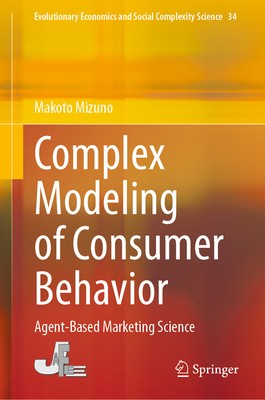
- Išsiųsime per 10–14 d.d.
- Autorius: Makoto Mizuno
- Leidėjas: Springer
- ISBN-10: 4431548734
- ISBN-13: 9784431548737
- Formatas: 0 x 0 x 0 cm, kieti viršeliai
- Kalba: Anglų
- Extra -15 % nuolaida šiai knygai su kodu: ENG15
Atsiliepimai
Aprašymas
This book reports what progress is being and should be made in marketing science by social complexity science through such means as agent-based modeling and complex networks, which is seldom addressed by books reviewing the state of the art of marketing research or marketing science. Recently, as the penetration of brand-new communication technologies such as social media or mobile phones is connecting consumers more tightly than ever, marketers should understand and harness complex social interactions between consumers as well as between consumers and firms. Traditional marketing science does not sufficiently capture such phenomena; hence, the emerging alternative approaches are reflecting advances in social complexity science. The aim of this book is to give an overview of these newly emerging research trends, focusing mainly on the following three topics: diffusion of new products, choice and relationship with existing brands and marketing communication including consumers' word-of-mouth. These topics have attracted a lot of attention among marketers in particular in rapidly growing markets such as hi-tech or services, where consumers' mutual interaction and their bounded-rational behavior play critical roles. The prospective readers of this book include researchers, graduate students and practitioners with high expertise (e.g. data scientists) in both marketing/consumer research areas and complexity science areas such as computer science, physics and mathematical social science. The book serves as a bridge by providing the evolving knowledge on social complexity modeling for marketing researchers and the accumulated knowledge on marketing/consumer research for complexity researchers. In addition to reviewing previous and ongoing studies, this book offers the agenda for future researchers to discuss what problems have not been solved yet and need social complexity science approaches.EXTRA 15 % nuolaida
Kupono kodas: ENG15
Akcija baigiasi už 2d.17:22:50
Nuolaidos kodas galioja perkant nuo 10 €. Nuolaidos nesumuojamos.

- Autorius: Makoto Mizuno
- Leidėjas: Springer
- ISBN-10: 4431548734
- ISBN-13: 9784431548737
- Formatas: 0 x 0 x 0 cm, kieti viršeliai
- Kalba: Anglų




Atsiliepimai